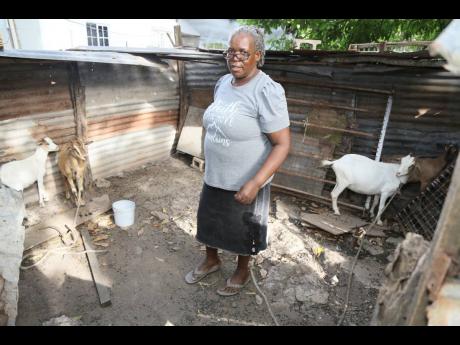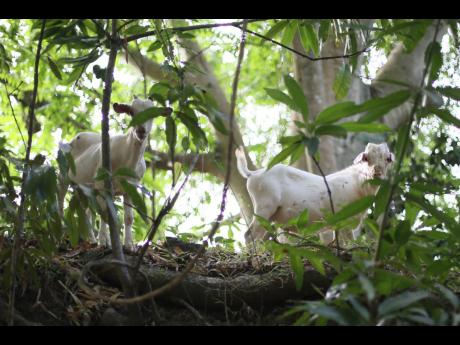Goat farmers savaged by deadly dog attacks
Clarendon turns killing field for herds
Goat farmers in Rock River, Clarendon, are crying for help amid a wave of deadly dog attacks on their livestock, with some interests warning that they might exit the industry. Boswell Bonner, who has now turned to planting peanuts and sorrel, said...
Goat farmers in Rock River, Clarendon, are crying for help amid a wave of deadly dog attacks on their livestock, with some interests warning that they might exit the industry.
Boswell Bonner, who has now turned to planting peanuts and sorrel, said he has no means of bouncing back after dogs killed his nine goats – three rams and six nannies close to delivering kids.
The financial hit has cost him more than $200,000, and it has proven difficult to locate the owners.
A frustrated Bonner said he had thought of killing dogs at random but refrained from taking that action for fear of committing animal cruelty.
He is ready to throw in the towel.
“Mi just call it a lost cause. Mi nuh know weh fi do and mi nuh know weh fi go. ‘Cause mi nuh tink mi coulda go a RADA and tell dem sey dog kill off mi goat because mi nuh tink dem responsible fi mi,” he said in a Gleaner interview, referencing the state-operated Rural Agricultural Development Authority.
He has no intention of picking up the pieces as he is afraid of being burnt again.
Jamar Crosse has been suffering at the hands of the dogs for the past two years. He lost 15 in 2020. Last year, the death toll was 14. So far this year he has lost five.
He, too, has grappled with the difficulty of traceability as many dogs in rural districts have no real owner – assuming a kind of communal status that obviates against liability.
Crosse is now pleading for assistance “for even two goats” to revive his ill-fated livelihood. He estimates his losses at more than $300,000.
Member of the Dam Head Farmers Group, Rosetta Taylor, is outraged at the preponderance of dog attacks on livestock, describing the scourge as “a terrible situation”. In one night alone, a farmer lost up to 10 goats, she said.
“They are feeding on private land and you hear the dogs and the goats bawling, but by the time you reach to them, the damage has already been done,” she told The Gleaner.
Taylor, who has lost five of her goats to deadly dog attacks, said no reports have been made to the police.
Long road to justice
Jamaica’s Parliament last year passed the Dogs (Liability for attacks) Act 2020 to impose tough financial penalties on owners held responsible for their animals causing death or serious injury.
A maximum fine of $3 million can be imposed on offenders.
But the road to justice is viewed as too long – and expensive – for many farmers, who have decided to cut their losses.
Eucal Henry, president of the Chapelton District Area Committee, notes, too, that farmers in Simon and Rock River are affected as well.
“To this end, some of the farmers lose two to 12 goats every year. The negative impact allows some of the farmers to give up goat rearing. Those who totally depend on goat rearing have to take turns watching their herds,” Henry said.
Agriculture already has a clutch of occupational hazards - from disease and pest infestation, to drought, to flooding and wind damage from storms. And thieves add a toll of an estimated $6 billion a year.
With no one being held accountable for the surge of dog attacks, Henry is weary of the mounting losses.
Trevor Bernard, president of the Goat and Sheep Farmers Association of Jamaica, said it is time for agricultural stakeholders to restrategise and adopt best practices. Farmers are being urged to not allow their herds to “run up and down all over the place”.
“You can’t really do that anymore, because you know you have the two-foot thief and you have the dogs which are out of control,” Bernard said.
“With the introduction of a new breed of dogs, it can become vicious and just prey on the goats and kill them,” he added.
Bernard has also encouraged farmers to embrace modern technology in securing goat enclosures. The association has also been on a drive to conduct training seminars.
Lenworth Fulton, president of the Jamaica Agricultural Society, is pressing goat farmers to report dog attacks to the police. He has also advised that extension officers be made aware of the plague.
Fulton said there is an avenue for farmers to receive assistance.
“One of the problems that I usually have when I was CEO is that you don’t know when a report comes up which is inflated, so you report the thing right away to the extension officer and the police so that you have references and write a simple little proposal to the RADA parish manager, even in a letter form, that you lost goats and you are seeking some assistance and get it in the record,” he said in a Gleaner interview.
Fulton said that during his tenure at RADA, he assisted many farmers who had fallen victim through the Production Incentive Programme, which this year totals $1.7 billion.
The JAS president said that he used the mechanism to repurchase goats to assist farmers in recovering.
Police Sgt Ricardo Hare, who interacts with the Rock River Farmers Watch Group, expressed surprise at the scale of the losses.
Stressing the need to submit reports in a timely manner, Hare said the police have been hosting sensitisation sessions with the goat farmers.
“Reporting it will even benefit them that we have something on paper in case they can get something from RADA or any agricultural agency. If they don’t report it, they won’t have anything to authenticate their stories,” said Hare.


